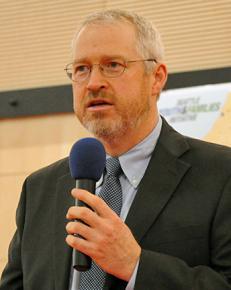Liberal hypocrisy in Seattle
What will it take to get the leading officeholders in Seattle to make good on their progressive promises? explains what's at stake.
SEATTLE HAS done better than most cities since the Great Recession hit. Unemployment in the metro area is "only" 5.9 percent. City government revenue is expected to be back to 2007 levels by 2014. The city itself lost 35,000 jobs by 2009, but a majority of those have come back--though at a lower average wage level.
The city and county governments put on a liberal face, from continual expressions of concern about "diversity" to Mayor Mike McGinn's praise of Occupy for raising the issue of inequality. The county that Seattle is in--Martin Luther King Jr. County, no less--puts out regular reports analyzing the impact of its policies on racial disparities. The city has adopted a plan to end homelessness within 10 years.
Sometimes, when there is enough popular pressure, this liberal face is reflected in progressive policies. Seattle now has an ordinance guaranteeing most workers the right to some sick leave. Those convicted of felonies no longer have to report their previous arrest or incarceration when applying for jobs.

Both of these were important but limited steps forward. State voters have proven themselves even more progressive on some issues--legalizing same-sex marriage and marijuana (if smoked in private) in 2012.
But the progressive rhetoric from politicians is still mostly that--official bombast. While McGinn praised Occupy, he allowed the police to evict its camp. While the county wrings its hands over racial disparity, it presides over a criminal injustice system where Black men are eight times as likely to be imprisoned as white men. While youth incarceration rates are down, the county is still planning to spend $210 million on a new juvenile jail.
When both McGinn and County Executive Dow Constantine recently appeared at a Transit Riders Union rally to call for more state bus funding, they refused to free up city or county resources to cover an impending 19 percent service cut.
The supposed plan to end homelessness is in its sixth year--but homelessness has actually risen, as have gentrification and rental rates. More and more working-class and poor people have been driven out of the city for lack of affordable housing.
The minimum wage in Washington state is the highest in the U.S., but minimum-wage workers still can't afford housing in the city. The $15-an-hour minimum-wage movement among fast food workers has spread to Seattle, with a day of strikes and then civil disobedience against wage theft.
While politicians decry inequality and talk about their commitment to help the poor, Washington's tax structure is the most regressive in the U.S.--the bottom 20 percent of the population pays over 17 percent of its income in state and local taxes. The top 1 percent pays less than 3 percent.
THE CITY government's budget reflects the real priorities of the economic system. Over half of the budget is spent on "public safety"--28 percent on the police department alone--and that's not even counting what's spent on the court system.
The city's budget report brags about saving $25 million by reducing employees' cost-of-living allowances over four years--in other words, the mayor who "opposes inequality" also believes in cutting the real wages of city workers. Meanwhile, health and human services receive only 6 percent of the city budget.
The proportion of the budget spent on the police is even more of a problem since the Department of Justice has sued the Seattle police for excessive use of force, denial of constitutional rights and racially disparate treatment.
The remedies proposed were relatively mild, but Mayor McGinn sided with the police in fighting against the Justice Department to weaken the terms of the consent decree. When push comes to shove, the liberal mayor supports the police over the victims of police brutality and racism.
The priorities of the city government were shown again on August 16, when McGinn suddenly "discovered" an extra $400,000. Did he use it to fund the bus service? Support more low-income housing? Restore cuts in social service budgets? Help the homeless? Did he use it to attack the sources of social distress that can cause crime?
No, he gave in to the demands of downtown business and used it to increase the police presence in the downtown area. The $400,000 will result in $6,000 more overtime hours for cops, or the equivalent of another six to eight positions through the end of the year.
The political situation in Seattle, as in the rest of the nation and the world, cries out for popular opposition and a demand to change the priorities of the government and system.
The level of struggle in Seattle is low but increasing, with organizing against racism, low wages, the oppression of women, homelessness, transit cuts, corporate education deform and environmental destruction picking up. Openness to more radical solutions is rising.
In the August primary, a socialist candidate for City Council, Kshama Sawant, came in second of three candidates in the race, with a vote of 35 percent. This is probably the largest vote for a socialist candidate in Seattle since the 1930s.
The prospects for more, larger and more successful struggles are on the horizon--as long as people see through the liberal hypocrisy of the politicians and organize independently.


